 CENTRAL ENGLAND: Mike Wheeler's concert reviews from Nottingham and Derbyshire feature high profile artists on the UK circuit - often quite early on their tours.
CENTRAL ENGLAND: Mike Wheeler's concert reviews from Nottingham and Derbyshire feature high profile artists on the UK circuit - often quite early on their tours.
 FEEDBACK: She said WHAT? Read what people think about our Classical Music Daily features, and have your say!
FEEDBACK: She said WHAT? Read what people think about our Classical Music Daily features, and have your say!
 DISCUSSION: What is a work? John Dante Prevedini leads a discussion about The performing artist as co-creator, including contributions from Halida Dinova, Yekaterina Lebedeva, Béla Hartmann, David Arditti and Stephen Francis Vasta.
DISCUSSION: What is a work? John Dante Prevedini leads a discussion about The performing artist as co-creator, including contributions from Halida Dinova, Yekaterina Lebedeva, Béla Hartmann, David Arditti and Stephen Francis Vasta.
Terrific Energy
MIKE WHEELER reviews a recording of
Opera North's recent production of
Kurt Weill's 'Street Scene'
Nottingham missed out on Opera North's regular March visit this year - the Theatre Royal announced its closure the day the week's run was due to start. Fortunately, BBC Radio 3 was at the Grand Theatre, Leeds, UK, on 12 February, to record the company's new production of Kurt Weill's Street Scene, and this was broadcast on 11 April 2020. So, with the help of some production photos and a few brief video clips on ON's Twitter feed, here goes:
Opera North has form with Weill. I remember fine productions of Arms and the Cow (Der Kuhhandel) and One Touch of Venus - there was also Love Life, which I didn't get to see. With a cast of over thirty, Street Scene is above all a great ensemble piece, and so played right to Opera North's strengths. A high-water mark of Weill's American career, it is based on Elmer Rice's Pulitzer Prize-winning play of the same title. In what is essentially a tragedy of domestic violence, the motif of unfulfilled longing plays out in a number of cross-cutting story-lines. We see the ethnically mixed inhabitants of a New York tenement block coming and going, interacting, gossiping, coping with life's ups and downs - mostly downs - and trying to stay cool in a stifling heatwave.
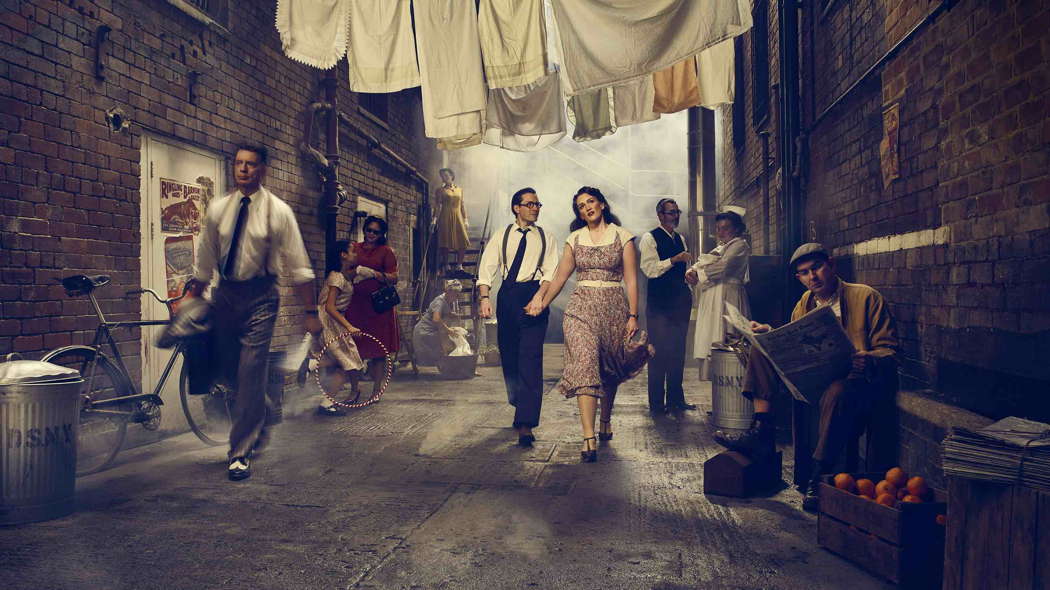
A publicity photo for Opera North's production of Kurt Weill's Street Scene
Central to the scenario are the Maurrants - Anna and Frank, their grown-up daughter Rose and younger son Willie.
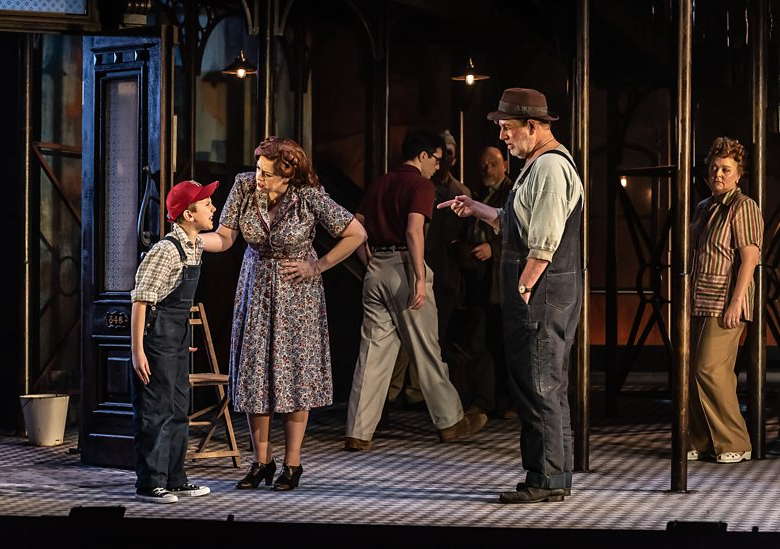
From left to right: Louis Parker as Willie Maurrant, Giselle Allen as Anna, Alex Banfield as Sam Kaplan, Robert Hayward as Frank and Claire Pascoe as Emma Jones in Opera North's Street Scene
In her big Act I number, 'Somehow I Never Could Believe', Giselle Allen balanced the poignancy of Anna's disappointed dreams with a still-flickering belief in a better life.
Robert Hayward's Frank was not just a reactionary bully. 'Let Things Be Like They Always Was' gave a glimpse of the pain behind the bluster, the tragedy of someone who simply cannot adjust to a changing world.
Of the two would-be lovers, Alex Banfield captured Sam Kaplan's gauche idealism, while avoiding any tendency to self-pity in a powerful account of his solo number 'Lonely House', which Weill said was 'almost a theme song for the show'.
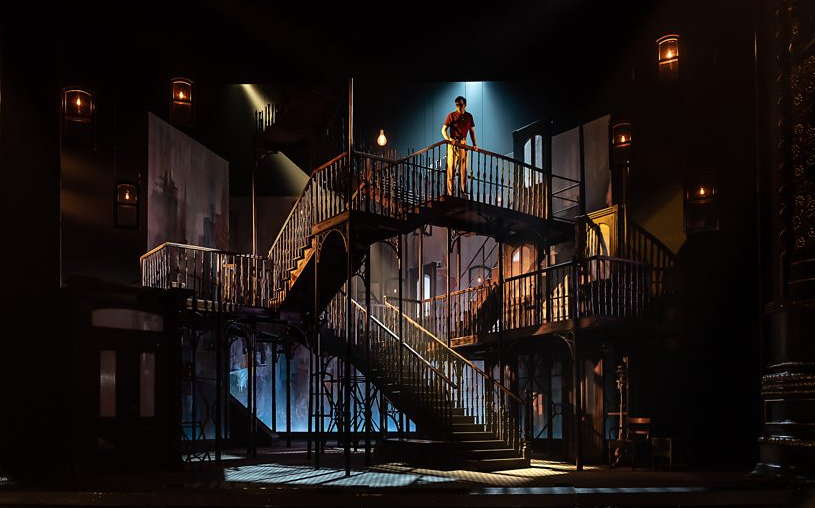
Alex Banfield as Sam in 'Lonely House' from Opera North's Street Scene
As the more mature of the two, Rose Maurrant is the most developed character, and Gillene Butterfield carried all the role's dramatic weight, vulnerable but also capable of deflecting the predatory advances of her lounge-lizard boss, Harry Easter - Quirijn De Lang somehow managing to suggest he knew he was on to a loser, however hard he drove his chat-up routine in 'Wouldn't You Like To Be On Broadway?'. In 'What Good Would The Moon Be?' Butterfield portrayed both Rose's awareness of her predicament and her uncertainty of the way out. Her final Act I duet with Sam, 'Remember that I Care', was a touching picture of them reaching out to each other but not quite able to connect.
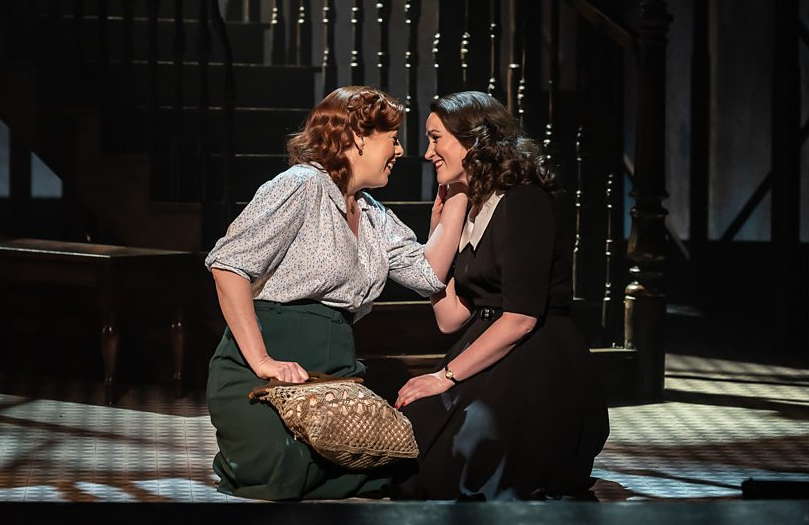
Giselle Allen as Anna and Gillene Butterfield as Rose in Opera North's Street Scene
The moments of light relief come mainly in Act I. The biggest show-stopper of them all, the song-and-dance number 'Moon-faced, Starry-eyed' actually goes to two of the peripheral characters, Dick McGann and Mae Jones; Rodney Vubya and Michelle Andrews threw themselves into it with terrific energy.
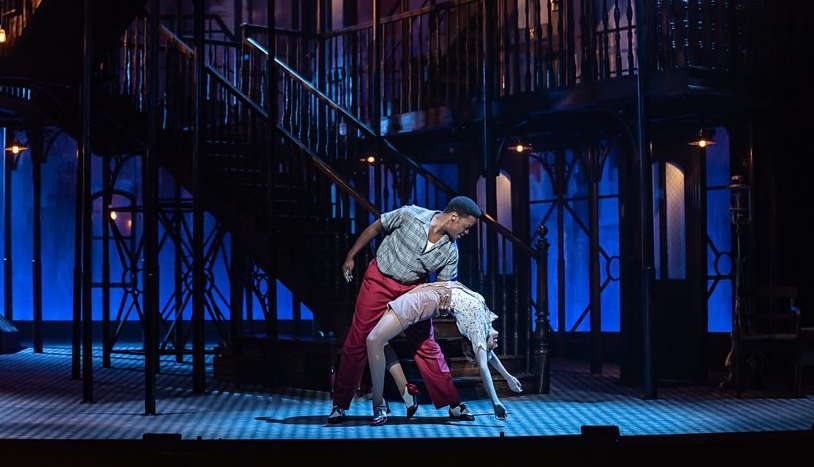
Rodney Vubya as Dick McGann and Michelle Andrews as Mae Jones in ‘Moon-Faced, Starry-Eyed’ from Opera North's Street Scene
The Opera North Chorus, from which many of the solo roles were cast, was its usual vibrant self, with plenty of emotion in reserve for the unfolding tragedy and its aftermath in Act II. There's a sizeable role for a children's chorus, too, and Opera North's team produced bright, perky accounts of their street game at the start of Act II and, in Act I, 'Wrapped In A Ribbon And Tied In A Bow', as Jennie Hildebrand (Laura Kelly-McInroy) came home from school having won a scholarship to art school (but the family is due to be dispossessed the following day for being unable to pay the rent - it's that sort of show).
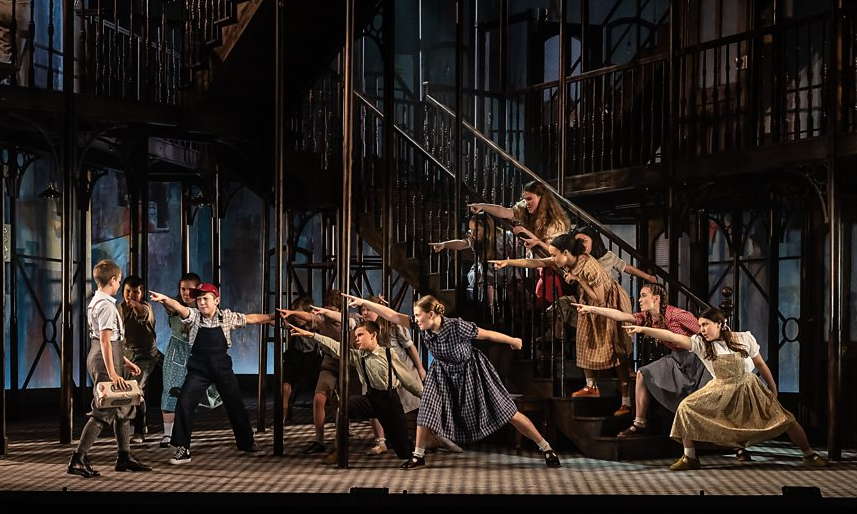
The children’s street game from Act II of Opera North's Street Scene
With conductor James Holmes, the Opera North Orchestra once more demonstrated its ability to morph into a sharp, sassy Broadway pit band. The introduction to Act I set the tone, moving easily from the grinding, abrasive foretaste of 'Lonely Town' at the start, to the tense urgency, then the easy swing, of what followed. The noticeable increase in tension later, when Frank Maurrant first appears, was a small but telling detail. I even fancied I caught curious fleeting echoes of Delius in some of the woodwind solos. (Weill famously made his own orchestrations instead of the usual Broadway practice of farming them out to a resident arranger like Robert Russell Bennett.)
Designer Francis O'Connor placed the action inside the tenement as well as on the street outside, on a three-tier set dominated by its huge, impersonal central stairwell.
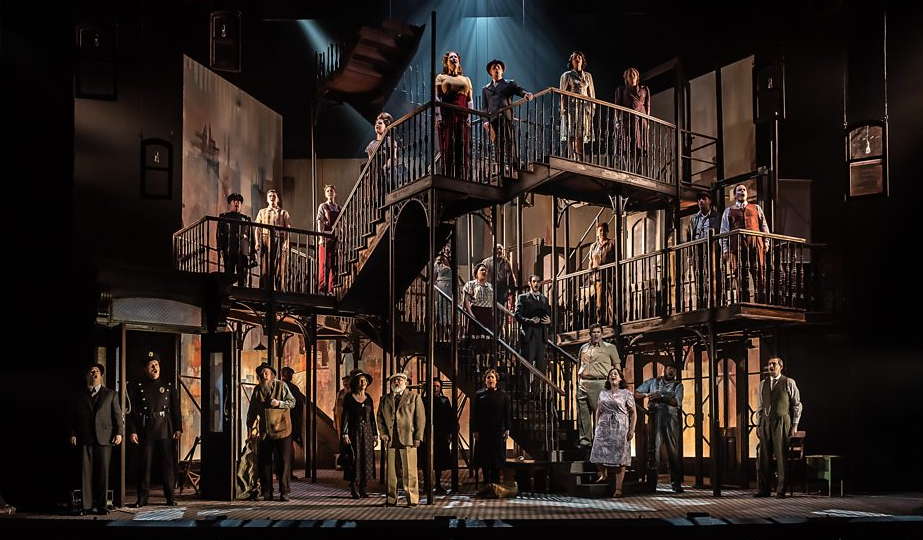
Opera North's Street Scene
Delivery of the spoken dialogue sometimes felt just a bit stilted. And the show itself has flaws. Some of Elmer Rice and Langston Hughes' lyrics strike a prosaic note, and occasionally Weill turns in some oddly rushed word-setting. The Act II number for two passing Nursemaids, ghoulishly lapping up the newspaper reports of the tragedy, somehow fails to hit its intended mark. The 'Ice Cream Sextet' in Act I is fun but over-long.
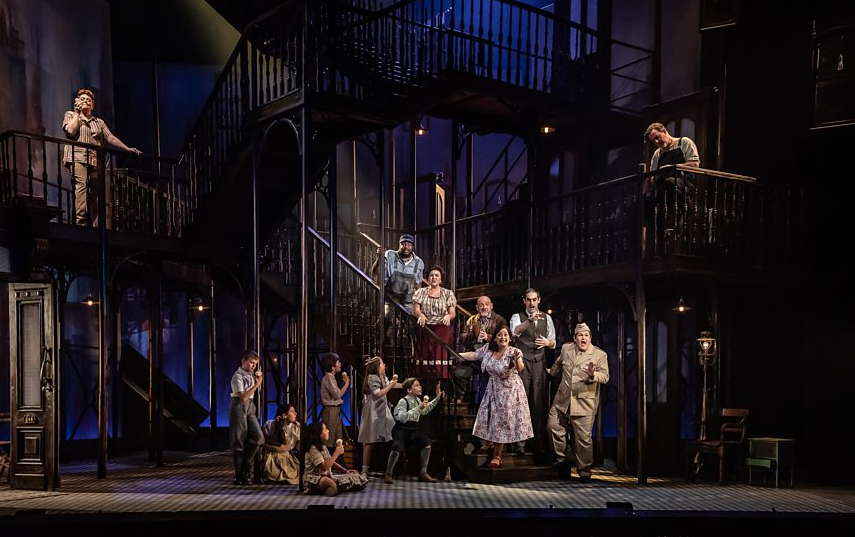
The 'Ice Cream Sextet' in Opera North's Street Scene
But the work's sheer humanity is big enough to absorb a few wrinkles, and Matthew Eberhardt's production made sure it came across in spades. What a pity it wasn't filmed for streaming - let's hope we don't have to wait too long for the revival.
Copyright © 16 April 2020
Mike Wheeler,
Derby UK

FURTHER INFORMATION: KURT WEILL
FURTHER REVIEWS OF OPERA NORTH PRODUCTIONS


